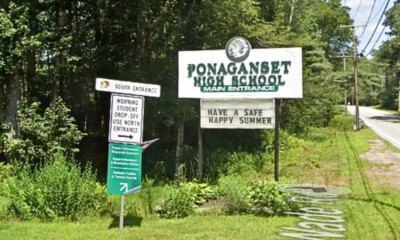Connecticut
Is Connecticut one of the next Blue Zones? | Moffly Media

If drinking an elixir of bone broth, dehydrated pig blood, and celery juice while cold plunging in 39-degree spring and sea water could potentially extend your life, would you try it?
Chances are, you would, because the pursuit of longevity has become mainstream, with the global market expected to reach $183 billion by 2028.
But what if it was as easy as, say, living in Connecticut?
That’s what NowPatient’s newest index—inspired by the 2023 Netflix series “Live to 100: Secrets of the Blue Zones”—suggests, as
it aims to predict the next ten states to become Blue Zones.
Blue Zones are where some of the world’s oldest people live, characterized by lower chronic disease and significantly longer life expectancies. Currently, there are five Blue Zones globally, located in Italy, Greece, Japan, Costa Rica and Loma Linda, California.
According to the index, Connecticut is the eighth most likely state to become the next Blue Zone. So we asked an expert for his take.
“We have to remember that Blue Zones are something researchers have been looking at for years, but the man who popularized it wasn’t a researcher, but a journalist,” says Andrew Garritson, vice president of education at the Nutritional Coaching Institute and founder of Argentum, a quality information control organization.
“By nature, his job is to capture attention. So when we see one of the Power 9 criteria for a Blue Zone being ‘Wine at 5’, we should be skeptical,” he says.
Research is pretty well established around alcohol consumption being associated with all-cause mortality, he adds, so to claim that ‘moderate drinkers outlive non-drinkers’ is misleading.
“It’s correlation, not causation,” he says. “That said, everything is a trade-off. Moderate alcohol consumption can be the mechanism indicating that a community is more socially fulfilled—and social fulfillment and belonging has been shown to increase longevity.”
“So the physical trade-off of alcohol consumption can be offset by the social benefits that come from the environment it’s consumed in,” says Garritson.
In the new index citing Connecticut as a promising Blue Zone candidate, researchers looked at mental health, diet, exercise, religion, plant-based diets, sleep and life expectancy.
When asked for his take, Garritson largely agreed with the criteria observed to increase longevity. “It’s not necessarily about religion … per se,” says Garritson. “Religion might be the mechanism that shows you’re plugged into a social community.”
He adds that recent research showed that there was decreased all-cause mortality with a plant-based diet, but notes that people who follow plant-based diets can be at higher risk of nutrient deficiencies, which can lead to sickness.
“The key is to eat complete sources of protein in a plant-based diet, which requires a more mindful food selection,” he says.
So, does Connecticut have a shot at becoming the next Blue Zone? Yes, but the criteria for getting there might need a bit of a deeper dive.
WHEN IT COMES TO DIRECT, NO-NONSENSE, SCIENCE-BASED FACTORS THAT CONTRIBUTE TO LONGER, HEALTHIER LIVES, ANDREW GARRITSON DRILLS IT DOWN TO THESE FIVE HABITS:
-
- Having a strong sense of purpose
- Strength training 3 to 5 times per week
- Getting 7 to 9 hours of sleep
- Drinking at least half your bodyweight in ounces of water per day
- Managing obesity
Image: Julija – stock.adobe.com
Andrew Garritson has helped more than 2,000 people lose 40,000+ pounds of fat, gain 4,600+ pounds of lean body mass, and eliminate 100+ medications You can connect with him on LinkedIn.

Connecticut
Hartford community grieves men killed in police shootings

The Hartford community is grappling with two police shootings that happened within eight days of each other. Both started off as mental health calls about someone in distress.
People came together to remember one of the men killed at a vigil on Wednesday evening.
With hands joined, a prayer for peace and comfort was spoken for the family of Everard Walker. He was having a mental health crisis when a family member called 211 on Feb.19.
Two mental health professionals from the state-operated Capitol Regional Mental Health Center requested Hartford police come with them to Walker’s apartment on Capitol Avenue.
A scuffle ensued, and police said it looked like Walker was going to stab an officer. The brief fight ended with an officer shooting and killing Walker.
The family is planning to file a wrongful death lawsuit against the city.
“All I will have now is a tombstone and the voicemails he left on my phone that I listen over and over again at night just so I can fall asleep,” Menan Walker, one of Walker’s daughters, said.
City councilman Josh Michtom (WF) is asking whether police could have acted differently.
“To me, the really concerning thing is why the police were there at all, why they went into that apartment in the way that they did, in the numbers that they did,” he said.
The president of Hartford’s police union, James Rutkauski, asked the community to hold their judgment and wait for a full investigation by the Inspector General’s office to be completed.
A different tone was taken in a statement released about another police shooting on Blue Hills Avenue on Feb. 27.
Rutkauski said the union fully supports the officer who fired at 55-year-old Steven Jones, who was holding a knife during a mental health crisis.
In part, the union’s statement says that Jones “deliberately advanced on the officer in a manner that created an immediate threat of death or serious bodily injury. This was a 100% justified use of deadly force.”
The Inspector General’s office will determine if the officer was justified following an investigation.
The officer who shot Jones was the fourth to arrive on the scene. Three others tried to get him to drop the knife, even using a taser, before the shooting.
“It just feels like beyond the conduct of any one officer, we have this problem, which is that we send cops for every problem,” Michtom said. “I don’t know how you can de-escalate at the point of a gun.”
Jones died from his injuries on Tuesday.
The union’s statement went on to say that officers should not be society’s default for mental health professionals. The statement said in part, “We ask for renewed commitment from our legislators to remove police from being the vanguard of what should be a mental health professional response.”
The officers involved in both shootings are on administrative leave.
Connecticut
Connecticut Launches New Era for Community Hospital Care – UConn Today

Marked by a ceremonial ribbon cutting and attended by Governor Ned Lamont, state legislators, Waterbury officials, and community leaders, UConn Health celebrated the acquisition of Waterbury Hospital which as of today is now the UConn Health Waterbury Hospital.
“This is a defining moment for healthcare in Connecticut,” said Dr. Andrew Agwunobi, CEO of UConn Health Community Network. “We now have the opportunity to take the award -winning academic quality and service of UConn Health and share it with the wonderful employees, doctors and community of Waterbury.”
Connecticut Governor Ned Lamont described the initiative as a forward-looking investment in the future of healthcare access across Connecticut.
“Connecticut is leading with innovation,” said Connecticut Governor Lamont. “The UConn Health Community Network reflects a proactive approach to strengthening community-based care by connecting it directly to the capabilities of our state’s public academic medical center. What begins in Waterbury today, represents a new model designed to expand opportunity, access, and excellence for communities statewide.”
In addition to UConn Health Waterbury Hospital, the Network includes UConn Health Community Network Medical Group and UConn Health Waterbury Health at Home. The model preserves each member’s local identity and will grow thoughtfully over time to improve quality, expand access, and reduce the total cost of care.
“This reflects a bold step forward in how we think about healthcare in Connecticut,” said John Driscoll, Chair of the UConn Health Board of Directors. “Today we celebrate the beginning of a new approach to community-based care. We move forward with clarity of purpose and shared commitment to serve our communities better together.”
Comptroller Sean Scanlon highlighted the significance of the model for the long-term evolution of healthcare delivery in Connecticut.
“This partnership represents thoughtful leadership at a pivotal time for healthcare,” said Connecticut Comptroller Sean Scanlon. “By aligning community hospitals with academic medicine, Connecticut is building a modern framework that positions our healthcare system to meet the needs of patients today and into the future.”
“Hosting this celebration on our campus is deeply meaningful for our staff, physicians and the families we serve,” said Deborah Weymouth, President of UConn Health Waterbury Hospital. “Waterbury’s legacy of care continues, and we are tremendously proud to have a strong partner who is deeply committed to our community and help lead this next chapter for healthcare.”
Welcome UConn Health Waterbury Hospital!
Connecticut
Multiple cars involved in crash on I-84 in Hartford

A multi-vehicle crash temporarily close Interstate 84 on Tuesday night.
The crash happened around 8:30 p.m. and involved four cars, according to the Hartford Fire Department.
Fire crews arrived at the scene and helped one of the drivers who was trapped. The driver was then taken to a local hospital for evaluation and treatment.
Four other people reported minor injuries but declined ambulance treatment at the scene, officials said.
I-84 East was temporarily shut down as crews responded but has since reopened.
The Connecticut State Police is investigating the crash.
-

 World1 week ago
World1 week agoExclusive: DeepSeek withholds latest AI model from US chipmakers including Nvidia, sources say
-

 Massachusetts1 week ago
Massachusetts1 week agoMother and daughter injured in Taunton house explosion
-

 Wisconsin3 days ago
Wisconsin3 days agoSetting sail on iceboats across a frozen lake in Wisconsin
-

 Maryland4 days ago
Maryland4 days agoAM showers Sunday in Maryland
-

 Denver, CO1 week ago
Denver, CO1 week ago10 acres charred, 5 injured in Thornton grass fire, evacuation orders lifted
-

 Florida4 days ago
Florida4 days agoFlorida man rescued after being stuck in shoulder-deep mud for days
-

 Massachusetts2 days ago
Massachusetts2 days agoMassachusetts man awaits word from family in Iran after attacks
-

 Oregon6 days ago
Oregon6 days ago2026 OSAA Oregon Wrestling State Championship Results And Brackets – FloWrestling




















